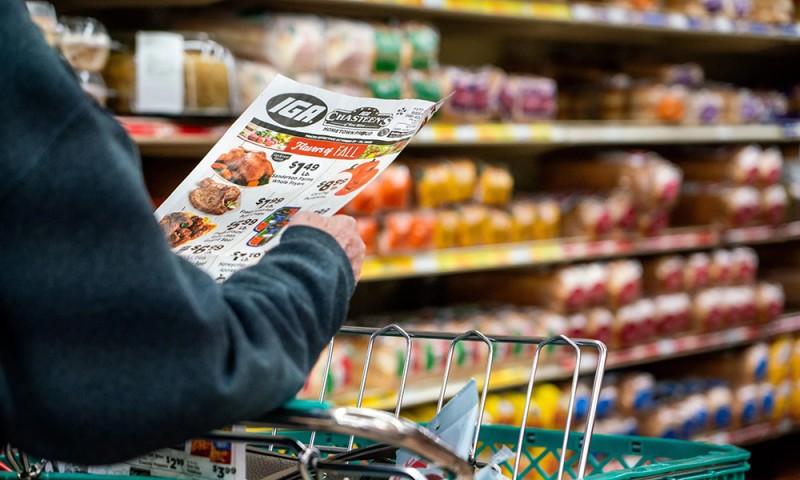
一位华尔街分析师指出,特朗普上周宣布取消的关税对消费者通胀影响甚微,但此举可能预示着政策将发生重大转向。
特朗普上周五表示,将取消对牛肉、咖啡、热带水果及一系列其他大宗商品的关税,尽管他此前一直坚称其关税政策并未推高物价。此举是在非大选年选举之后采取的,当时选民对高昂的生活成本表示抗议,导致共和党遭遇惨败。
牛津经济研究院首席美国经济学家伯纳德·亚罗斯 (Bernard Yaros) 上周五在一份报告中写道,鉴于进口食品仅占美国家庭消费的10%,此次关税取消对通胀的影响“几乎可以忽略不计”。但其影响将辐射至更广层面。
“食品价格也严重影响消费者的通胀心理,更不用说他们的情绪了,”他解释道。“在所有主要食品类别中,消费者情绪历来对肉类、家禽和蛋类价格最为敏感,其次是谷物。”
事实上,食品店的价格震惊已引发了对提高物价可负担性的强烈诉求,这成为近期选举的核心议题。
尽管消费者通胀率已从2022年9%的高位大幅回落,但物价仍在缓步上涨,且关税政策导致年通胀率居高不下——自特朗普发动贸易战以来,甚至略有上升。选民们现在更支持那些承诺控制特定成本的政客。
随着两党均已着眼2026年中期选举,亚罗斯认为,若以其最新举措为风向标,特朗普可能会提供更多关税减免。
“然而,对前景而言更重要的是,此举传递出的关于未来关税调整方向转变的信号,”他表示。“随着选举临近,政府可能会将这些关税豁免范围扩大至更广泛的食品品类。”
亚罗斯指出了其他关税压力缓解的迹象,例如特朗普近期与瑞士达成的贸易协议,将关税税率从39%大幅降至15%。后续可能还会与巴西和印度达成额外协议,同样降低对这些国家的关税。
但根据旧金山联邦储备银行研究人员的一份工作论文,如果特朗普的目标是抗击通胀,他实际上可能希望维持其关税政策。
该研究考察了150年来的关税数据,得出结论认为关税会抑制经济活动和就业,从而导致通胀降低。
“通胀反应与标准模型的预测背道而驰,按照标准模型,CPI通胀应对关税提高而上升,”研究人员雷吉斯·巴尼雄 (Régis Barnichon) 和阿尤什·辛格 (Aayush Singh) 写道。“相反,关税冲击似乎扮演了总需求冲击的角色——使通胀和失业率同向变动。”(*)
译者:中慧言-王芳
一位华尔街分析师指出,特朗普上周宣布取消的关税对消费者通胀影响甚微,但此举可能预示着政策将发生重大转向。
特朗普上周五表示,将取消对牛肉、咖啡、热带水果及一系列其他大宗商品的关税,尽管他此前一直坚称其关税政策并未推高物价。此举是在非大选年选举之后采取的,当时选民对高昂的生活成本表示抗议,导致共和党遭遇惨败。
牛津经济研究院首席美国经济学家伯纳德·亚罗斯 (Bernard Yaros) 上周五在一份报告中写道,鉴于进口食品仅占美国家庭消费的10%,此次关税取消对通胀的影响“几乎可以忽略不计”。但其影响将辐射至更广层面。
“食品价格也严重影响消费者的通胀心理,更不用说他们的情绪了,”他解释道。“在所有主要食品类别中,消费者情绪历来对肉类、家禽和蛋类价格最为敏感,其次是谷物。”
事实上,食品店的价格震惊已引发了对提高物价可负担性的强烈诉求,这成为近期选举的核心议题。
尽管消费者通胀率已从2022年9%的高位大幅回落,但物价仍在缓步上涨,且关税政策导致年通胀率居高不下——自特朗普发动贸易战以来,甚至略有上升。选民们现在更支持那些承诺控制特定成本的政客。
随着两党均已着眼2026年中期选举,亚罗斯认为,若以其最新举措为风向标,特朗普可能会提供更多关税减免。
“然而,对前景而言更重要的是,此举传递出的关于未来关税调整方向转变的信号,”他表示。“随着选举临近,政府可能会将这些关税豁免范围扩大至更广泛的食品品类。”
亚罗斯指出了其他关税压力缓解的迹象,例如特朗普近期与瑞士达成的贸易协议,将关税税率从39%大幅降至15%。后续可能还会与巴西和印度达成额外协议,同样降低对这些国家的关税。
但根据旧金山联邦储备银行研究人员的一份工作论文,如果特朗普的目标是抗击通胀,他实际上可能希望维持其关税政策。
该研究考察了150年来的关税数据,得出结论认为关税会抑制经济活动和就业,从而导致通胀降低。
“通胀反应与标准模型的预测背道而驰,按照标准模型,CPI通胀应对关税提高而上升,”研究人员雷吉斯·巴尼雄 (Régis Barnichon) 和阿尤什·辛格 (Aayush Singh) 写道。“相反,关税冲击似乎扮演了总需求冲击的角色——使通胀和失业率同向变动。”(*)
译者:中慧言-王芳
The tariffs that President Donald Trump rolled back this past week will barely move the needle on consumer inflation, but his retreat potentially signals a major shift, according to a Wall Street analyst.
On Friday, Trump said he will scrap tariffs on beef, coffee, tropical fruits and a range of other commodities, even after insisting that his duties haven't raised prices. That followed off-year elections that delivered stunning defeats to Republicans as voters protested the high cost of living.
Given that imported food makes up just 10% of what U.S. households consume, the tariff rollback's impact on inflation is a “practically a rounding error,” wrote Bernard Yaros, lead U.S. economist at Oxford Economics, in a note on Friday. But they will have outsized effects beyond the economic data.
“Food prices also weigh heavily on consumers' inflation psychology, not to mention their sentiment,” he explained. “Of all major food categories, consumer sentiment is historically most sensitive to the price of meats, poultry, and eggs, followed by cereals.”
Indeed, sticker shock at the grocery store has fueled demands for more affordability, which was a central issue in the recent elections.
Despite consumer inflation cooling sharply from 9% in 2022, prices are still ticking up, and tariffs have kept the annual rate sticky---even edging higher since Trump launched his trade war. Voters are now rewarding politicians who promise to freeze certain costs.
With both parties already looking ahead to the 2026 midterm elections, Yaros sees Trump providing more tariff relief if his latest move is any indication.
“What matters more for the outlook, though, is the signal that this move sends about the directional shift of future tariff adjustments,” he said. “As we near the election, the administration may broaden these tariff exemptions to a wider swathe of food products.”
Yaros pointed to other signs of easing tariff pressure, such as Trump's recent trade deal with Switzerland that will slash the rate to 15% from 39%. Additional agreements with Brazil and India may follow, lowering tariffs on those countries as well.
But according to a working paper from San Francisco Fed researchers, Trump may actually want to maintain his tariffs if his goal is to fight inflation.
The study examined 150 years of tariffs and concluded that they depress economic activity and employment, resulting in lower inflation.
“The inflation response goes against the predictions of standard models, whereby CPI inflation should go up in response to higher tariffs,” researchers Régis Barnichon and Aayush Singh wrote. “Instead, tariff shocks appear to act as aggregate demand shocks---moving inflation and unemployment in the same directions.”

